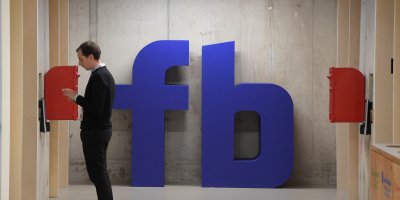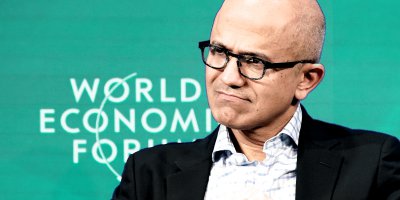
Technology doesn’t have an impact on us, it’s more subtle. Source: Shutterstock
Technotopia: Exploring business, education, society and gender
THE role of technology in society, the latest breakthroughs (and their implications) and the private sector’s place in developing the next generation of technology leaders are the subjects to be explored at an exciting one-day event to be held in Bristol, UK, in a fortnight.
Technotopia, a startup social technology company is hosting “People’s Tech Bristol 2018”, which will draw together young people, businesses, thought leaders and educators for a day of exhibitions, demos, talks, and discussion.
The organizer, Karin Rudolph is by profession a sociologist who is obsessed with technology. From her perspective of one who has studied society, social interactions, and culture, she hopes the event will highlight the issues that concern society, business, and the ordinary citizenry.
The idea for the event came about as Karin’s own child, at age four or five, began to use the technology found at home. She realized that technology in the hands of an infant is as normal to him or her as the air we breathe, the presence of television and all the complexity of the modern city.
This led her to begin to disparage the notion, often exposited by the media, of technology having an “impact” on us, and therefore on society as a whole.
“To have an impact implies passivity,” she said in an interview with Tech Wire Asia. “But we are not passive, with technology affecting us. How can technology have an effect on us, if it’s everywhere, part of life?”
We interact with technology every day, and our interactions are both created by and mold the data which is used by big companies, like Google, Sina Weibo, Facebook, and Line. In turn, states Rudolph, “those are the companies, the big companies that shape us.”
The point of the event, (and there are more planned for the near future), is to engage with ordinary people, local businesses, innovators, and developers of technology, in order to create discussions about technology, and how it can and will shape us. In sociological terms, the idea is to create a “dialectic dialog”, according to Rudolph.
The day-long event brings together influential speakers and companies, both small and large, local colleges and anyone interested in technology, commerce, and society. Contributors include:
• Ultrahaptics: this exciting company uses ultrasound to project physical sensations of touch onto, for instance, users’ hands or fingers.
By using multiple waveforms’ interactions, the sense of pushing or feeling can be conjured in mid-air, paving the way for new machine-human interfaces.
• University of Bristol’s School of Civil, Aerospace and Mechanical Engineering: University of Bristol is a world leader in robotics, engineering, and science, and is considered one of the premium research institutions in the country.
Alongside undergraduates and postgraduates, staff offer a range of outreach programs out into the local community and beyond, including running science clubs, work experience weeks, science festivals and school visits.
• dBs Music: one of the country’s leaders in digital audio and media teaching, dBs will be showcasing a selection of interactive virtual reality & augmented reality projects to the public, with a particular focus on the latest in audio tech – 360-degree audio implementation techniques.
• VRGo Chair: as virtual reality takes steps every day to become ubiquitous, this company has developed a new kind of motion controller for virtual reality users. Tilt and spin in the real world is translated as a movement in the virtual, and the wireless connection frees up the users from annoying cables (and worse). VRGo’s offering integrates with any keyboard or gaming joypad without the need for proprietary hardware or APIs.
Among the speakers are at the one-day event are:
• Mike Lloyd, founder of CLBW, a company which specializes in technology education across the globe. Current projects are in Australia, China, Brazil, Singapore, and the UK.
Lloyd will be talking about artificial intelligence in a session designed to quickly give an understanding of how AI works and how it’s used.
• Charles Radclyffe is a well-known thought-leader in technology, a TEDx speaker, and is a published expert on AI, automation, and robotics. He will be sharing his insights as to what makes the current breakthroughs in artificial intelligence, automation, and robotics so important, and will offer some radical ways of thinking about the problem that might help alleviate the anxiety often portrayed in the media.
Believers in the “robots and AI will destroy us all” theory would do well to attend!
• Dr Benedict Gaster is a senior lecturer at another higher education institution located in Bristol, UK, the University of the West of England. Gaster will focus on the Internet of Things. He believes future IoT devices must be designed and built by everyone, beyond the current makers of today, to enable people of all ages, gender, and race to be part of innovation.
• Professor Stephan Lewandowsky, from the University of Bristol, will be discussing terms such as “post-truth” and “fake news”, and will explore the current state of society where news of inter-species cross-infection of new variants of avian flu can be spread by Twitter, rather than by medically-trained professionals!
Learners from around the world are preparing to start a Code Club with our free online @FutureLearn training! Sign up to join the discussion and get practical tips and advice: https://t.co/0gu53I5lUD #rpilearn pic.twitter.com/Ztp7qhvzaa
— Code Club (@CodeClubWorld) January 18, 2018
It is while we are discussing exhibitors Code Club, and pay disparity software company GapSquare that Karin Rudolph leads onto another area of specific interest to her – and one to be covered by several speakers at the event: technology will change society, she opines, but in order to change it more positively, the people at the top need to change.
“Firms need a wider perspective, they need to draw from a wider gene pool. Women are still rare in science, and middle-class white men dominate [the STEM workplace],” says Rudolph.
Because of the insidious nature of technology, the aims and objectives of those controlling it are dictating the very nature of society, to a greater extent than we might expect, she says.
To change the status quo, one of the objectives of the event is to attract as many young people as possible to attend and take part, and to interact with the businesses on the exhibition floor.
The role of the private sector is key in educating the next generation, Rudolph feels. Echoing recent comments by Microsoft CEO Satya Nadella, she says kids today are already learning from the private sector – albeit a private sector (like Google and Microsoft) who are accessed via the Internet.
As well as encouraging young people into technology, by bringing together educators and the private sector, thought leaders and pressure groups, the team behind Technotopia hope that not only will we become aware of what’s happening now, but also take a more active role in shaping the future.
“As technology is playing a vital role in every aspect of our lives I passionately believe that it is crucial to make technology and knowledge accessible to everyone,” says Rudolph.”
“We live in very exciting but also challenging times and we need now, more than ever, to get everyone involved in shaping technology that works for all of us.”
For more information, contact Technotopia.
READ MORE
- Safer Automation: How Sophic and Firmus Succeeded in Malaysia with MDEC’s Support
- Privilege granted, not gained: Intelligent authorization for enhanced infrastructure productivity
- Low-Code produces the Proof-of-Possibilities
- New Wearables Enable Staff to Work Faster and Safer
- Experts weigh in on Oracle’s departure from adland






